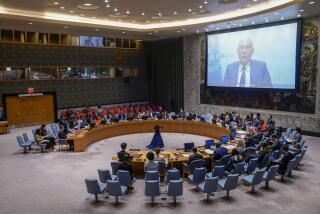N. Korea denounces sanctions over Sony hack; calls movie ‘disgusting’
- Share via
Reporting from Beijing — North Korea on Sunday denounced new economic sanctions imposed by President Obama in response to a cyberattack on Sony Pictures Entertainment that U.S. officials have blamed on the government of leader Kim Jong Un.
The country’s official news agency quoted an unnamed Foreign Ministry spokesman as saying the new sanctions would only “harden its will and resolution to defend…the dignity of the nation.”
The new penalties – which cut off access to the U.S. financial sector for 10 individuals and three government entities identified as key operatives engaged in hostile behavior, including the country’s intelligence agency – add to existing sanctions imposed on the nation in response to its nuclear weapons program.
The fresh sanctions, while largely symbolic, were the first public reprisal since U.S. officials blamed North Korea two weeks ago for the Sony hack, which came as the studio was preparing to release “The Interview,” a comedy starring Seth Rogen and James Franco that centers on a fictional plot to assassinate Kim.
North Korea has lauded the attack on Sony but denied it was behind it, proposing a “joint investigation” with the U.S. into the incident – a suggestion American authorities have ignored. On Sunday, the North’s Foreign Ministry spokesman characterized the film as a “disgusting movie openly agitating terrorism against a sovereign state.”
A number of cybersecurity experts have questioned U.S. officials’ assertion that North Korea was behind the attack, saying the Obama administration has not provided definitive proof that Pyongyang was responsible. The hackers who attacked Sony made public large caches of executive emails, completed films and scripts, and some analysts have suggested a disgruntled former employee or others could be to blame.
U.S. authorities have insisted that such doubts are misplaced and that the FBI and other U.S. agencies used classified information to confirm North Korea’s involvement in the intrusion.
Taking note of such doubts, the North said Sunday that Washington was “upset by the increased international skepticism” and characterized the sanctions as an attempt by Washington to save face.
However, neighboring South Korea — where banks, broadcasters and other entities have faced cyberattacks blamed on North Korea—issued a statement of support for Obama’s move.
“The U.S. government’s sanctions are seen as an appropriate countermeasure against North Korea’s policy and actions such as its persistent provocation, including the latest Sony Pictures hacking attack,” the South’s foreign ministry said in a statement on Saturday, adding that any attacks that damage the “openness and safety” of the Internet and infringe upon the interests of individuals and corporations cannot be tolerated.
U.S. officials have described the latest sanctions as one part of Washington’s response to North Korea’s “ongoing provocative, destabilizing, and repressive actions and policies.” That seemed to leave open the possibility that American authorities might pursue further retaliatory steps—either publicly or covertly.
Pyongyang said the sanctions announced Friday did not weaken the country but “proved counter-productive,” prompting new measures to “further sharpen the treasured sword” of North Korea’s military-first policy.
Follow @JulieMakLAT for news from China
More to Read
Sign up for Essential California
The most important California stories and recommendations in your inbox every morning.
You may occasionally receive promotional content from the Los Angeles Times.











